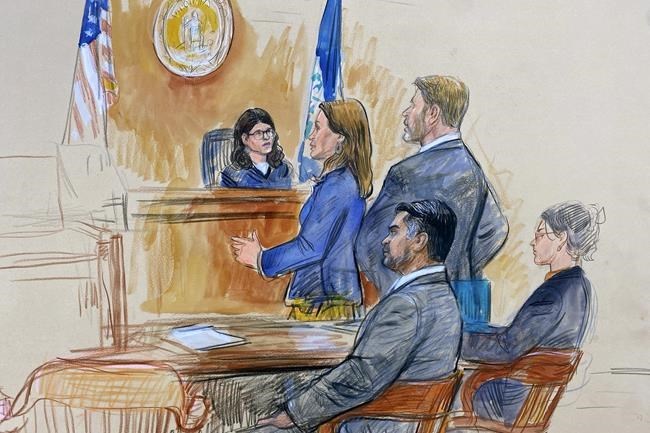
FILE - This courtroom sketch depicts Judge Dipti Pidikiti-Smith of the Fairfax County General District Court, presiding over the assault and battery trial of CIA officer trainee Ashkan Bayatpour, seated left, in Fairfax, Va., Wednesday, Aug. 23, 2023. Standing in front of the judge are the prosecutor, Deputy Commonwealth's Attorney Jenna Sands, left, and Bayatpour's defense lawyer Stuart A. Sears, right. The judge found Bayatpour guilty Wednesday of attacking a fellow CIA trainee with a scarf in the stairwell of CIA headquarters at Langley the previous year. Seated right is an unidentified defense team member. (Dana Verkouteren via AP, File)
Republished February 08, 2024 - 12:55 PM
Original Publication Date February 08, 2024 - 11:11 AM
The CIA this week terminated a woman whose whistleblower account of being assaulted in a stairwell at the spy agency's headquarters prompted a flood of colleagues to come forward with their own complaints of sexual misconduct. The woman's attorney called the action a brazen retaliation.
While the CIA said that accusation was “factually inaccurate,” it wouldn't comment further on the case and declined to explain why the 36-year-old did not make it through the agency’s clandestine officer training program known as “the Farm” and, unlike many of her classmates, was not hired into another job.
“To be clear, the CIA does not tolerate sexual assault, sexual harassment or whistleblower retaliation,” CIA spokesperson Tammy Thorp told The Associated Press, adding the agency uses “consistent processes to ensure the fair and equal treatment of every officer going through training.”
The woman’s termination came less than six months after she filed a federal civil rights lawsuit alleging the CIA retaliated against her for reporting what she said was a 2022 stairwell assault in Langley, Virginia, to law enforcement and testifying about it in a closed congressional hearing.
The lawsuit accused the agency of giving her harsher performance reviews and “slut shaming” her by improperly releasing her personal information during the state prosecution last year of Ashkan Bayatpour, a then-fellow CIA trainee convicted of assaulting her with a scarf.
The woman’s attorney, Kevin Carroll, told the AP that the CIA has now “unlawfully ended a young woman’s career only because she had the moral courage, lacking in her managers, to stand up and be a witness about her sexual assault.”
“The agency’s festering workplace sexual violence problem,” Carroll said, “is now harming the retention of young women who won’t put up with it any longer.”
The woman, who is not being identified because the AP does not generally identify victims of alleged sexual abuse, was credited with launching a reckoning, of sorts, at the CIA because hers was the rare allegation of sexual misconduct at the super-secret spy agency to make it into a public courtroom.
An AP investigation found the case helped embolden at least two-dozen women to come forward to authorities and Congress over the past two years with their own accounts at the CIA of sexual assaults, unwanted touching and what they contend is a campaign to keep them from speaking out.
Their accusations ranged from lewd remarks about sexual fantasies at after-work happy hours to a case in which a senior manager allegedly showed up at a subordinate’s house at night with a firearm demanding sex. Some of the alleged incidents go back years and took place as officers were on risky covert missions overseas, while others took place at CIA headquarters.
A congressional inquiry and bipartisan calls for a watchdog investigation prompted CIA Director William Burns last year to launch a series of reforms to streamline claims, support victims and more quickly discipline those behind misconduct.
It remains unclear whether the woman’s firing will prompt further action. Offices of the U.S. senators leading the inquiry, Virginia Democrat Mark Warner and Florida Republican Marco Rubio, did not respond to requests for comment.
Carroll, the woman's attorney, said she had been given protected whistleblower status before speaking with Congress. But those familiar with the Whistleblower Protection Act cautioned that such protections can be limited, especially at the CIA.
Tom Devine, a longtime whistleblower rights advocate who is legal director for the Government Accountability Project, said CIA employees don’t have the same rights as other federal employees because of national security concerns.
“You can blow the whistle, but only within the intel community," Devine said. “So when she went to the police, she was very much on her own. It’s an obnoxious loophole."
In her testimony to a Virginia judge last summer, the woman recounted the moment when Bayatpour allegedly tightened the scarf around her neck and tried to kiss her against her will.
“He made a face like he was trying to really hurt me,” she testified. “That face, that’s what stays with me to this day. That’s the hardest part.”
Bayatpour acknowledged wrapping the scarf around the woman in the stairwell but insisted his actions were intended in jest during a 40-minute walk together. The incident, his attorney said, was “a joke that didn’t land the way it was intended to land.”
Bayatpour, a 39-year-old Alabama native and former Navy intelligence officer, remained employed at CIA for several months after he was convicted in August of misdemeanor assault and battery, sentenced to six months probation and ordered to surrender any firearms.
But as of last month, he no longer works for CIA, according to a person familiar with the situation who wasn't authorized to discuss the matter and spoke on the condition of anonymity.
Bayatpour deferred questions to his attorney, Jennifer Steeve, who said her client has maintained his innocence and is appealing his conviction, which allows him a jury trial.
___
Mustian reported from New York and Goodman from Miami.
___
Contact AP’s global investigative team at Investigative@ap.org or https://www.ap.org/tips/
News from © The Associated Press, 2024